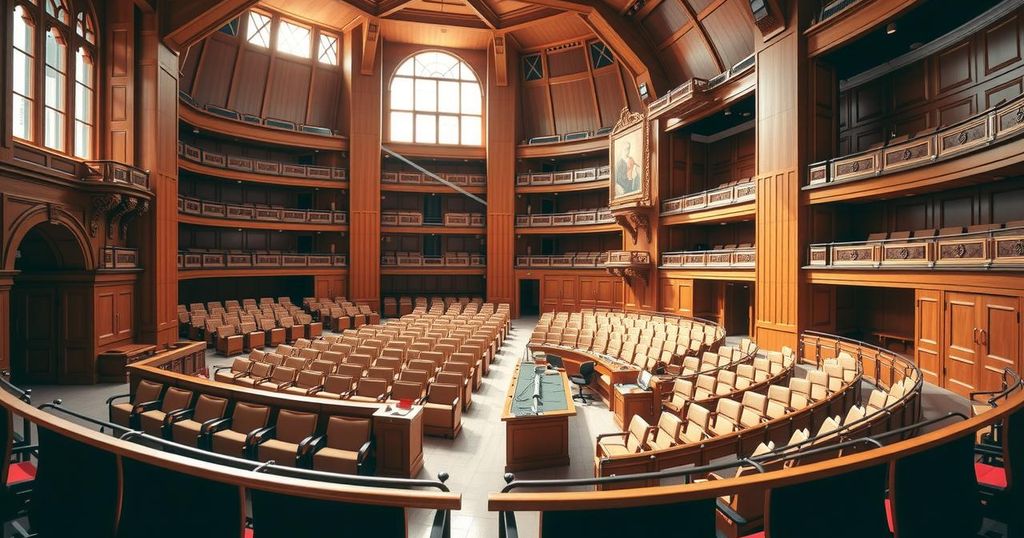The proposal by Speaker Richard Koon to recall Liberian parliamentarians from the ECOWAS Parliament has met with significant opposition from other lawmakers. The Majority Bloc’s appointment of new representatives is seen as a power struggle against Speaker Koffa. Many parliamentarians assert that ECOWAS rules prevent the recall of representatives post-oath, raising questions about the legality and appropriateness of Koon’s request.
In a recent session of the ECOWAS Parliament, Majority Bloc Speaker Richard Koon’s proposal to recall Liberian parliamentarians faced significant opposition from lawmakers across various nations. Many parliamentarians urged adherence to existing ECOWAS regulations, advocating for the retention of the current Liberian representatives instead of compliance with Koon’s request.
The Majority Bloc in the Liberian House of Representatives recently appointed three new delegates to represent Liberia at the ECOWAS Parliament. This decision followed a white-ballot election and was perceived as an attempt to shift power dynamics within the House, undermining Speaker Fonati Koffa’s influence.
The newly elected delegates from the Majority Bloc are Moima Briggs Mensah, Augustine Chiewolo, and Samson Q. Wiah. They succeeded Rev. Samuel Enders and Taa Wongbe, who were originally appointed during Speaker Koffa’s term. This replacement was driven by claims that Koffa’s appointments were made unilaterally without proper legislative endorsement.
Despite the Majority Bloc’s recent actions, numerous lawmakers have voiced strong objections to the recall initiative, citing ECOWAS Rule 5, which creates barriers to the recall of representatives post-oath. This rule permits recall only under strict conditions, such as resignation, incapacity, or gross misconduct.
A lawmaker stated anonymously, “It is not possible to replace your representatives once they have taken their oath, unless they are no longer a member of the body that sent them.” This sentiment underscores the complexities surrounding the recall proposal.
The senior Liberian representative at ECOWAS, Senator Edwin Snowe, publicly challenged the recall, emphasizing ECOWAS’s independence from member state decisions. He cautioned Liberian President Joseph Boakai to remain neutral in the ongoing controversy regarding parliamentary representation.
Acknowledgement of the recall proposal was made by the ECOWAS Parliament during the session, with the communication formally conveyed by Koon. Committee Clerk Hauwa Bello Aliyu confirmed that this correspondence would progress to the Secretary-General.
During the discussions, Hon. Abdul Kargbo from Sierra Leone reinforced the necessity of respecting ECOWAS protocols, asserting that representatives cannot be recalled once they have taken their oaths. He highlighted the importance of ECOWAS’s separation from domestic political affairs, thereby preserving its integrity.
Echoing this perspective, Senator Mohammed Ali Ndume of Nigeria remarked on the clarity of ECOWAS rules regarding member recall. He indicated that withdrawal is only permissible under specific conditions that involve ethical violations or loss of citizenship.
Hon. Sheriff Saar of Gambia remarked on the constitutional implications of the recall dispute, emphasizing that changes in leadership must adhere to constitutional mandates. He noted, “The constitution mandates the speaker to remain in office unless there is a constitutional reason for them to step down.”
The recent election reflects the Majority Bloc’s ongoing campaign to reverse all prior appointments made by Speaker Koffa, which they allege were procedurally flawed. However, Speaker Koffa, supported by the Rule of Law Caucus, counters that the Majority Bloc’s efforts are illegal, signaling a potential stalemate in the House pending ECOWAS’s response.
The recent call to recall Liberian parliamentarians from the ECOWAS Parliament has sparked substantial debate, with many lawmakers advocating for adherence to ECOWAS regulations. The Majority Bloc’s actions, along with the newly elected representatives, highlight internal power struggles within Liberia’s House of Representatives, but opposition rooted in established parliamentary rules complicates the situation further. The eventual resolution may have implications for Liberia’s political dynamics and representation within ECOWAS.
Original Source: frontpageafricaonline.com






